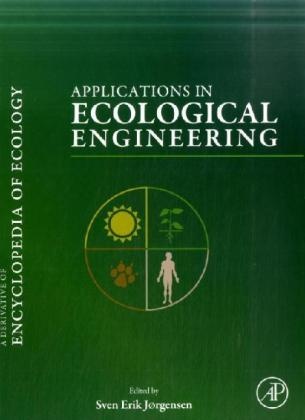Read more
Informationen zum Autor Sven Erik Jørgensen was the professor emeritus in environmental chemistry at the University of Copenhagen. He received a master of science in chemical engineering from the Danish Technical University (1958), a doctor of environmental engineering (Karlsruhe University) and a doctor of science in ecological modelling (Copenhagen University). He was the honourable doctor at Coimbra University, Portugal and at Dar es Salaam University (Tanzania). In 1975 he founded the journal Ecological Modelling and in 1978 the ISEM (International Society of Ecological Modelling). He has received several awards, the Ruder Boskovic Medal, the Prigogine Prize, the Pascal Medal, the Einstein professorship at the Chinese Academy of Sciences, the Santa Chiara Prize for multidisciplinary teaching and the very prestigious Stockholm Water Prize. He has published 366 papers of which 275 were published in peer-reviewed international journals and he has edited or authored 76 books, of which several have been translated to other languages (Chinese, Russian, Spanish and Portuguese). He has authored a successful textbook in ecological modelling “Fundamentals of Ecological Modelling?, which was published as a fourth edition together with Brian Fath in 2011. It has been translated into Chinese and Russian (third edition). He authored a well received textbook in system ecology entitled “Introduction to Systems Ecology?. It was published as an English edition in 2012 and as a Chinese edition in 2013. He was editor in chief of the Encyclopedia of Ecology, published in 2008, and of the Encyclopedia of Environmental Management, published in December 2012. He has taught courses in ecological modelling in 32 different countries. He is the editorial board member of 18 international journals in the fields of ecology and environmental management. He was the president of ISEM and he also was elected member of the European Academy of Sciences, for which he was the chairman of the Section for Environmental Sciences. Klappentext Ecological engineering involves the design, construction and management of ecosystems that have value to both humans and the environment. It is a rapidly developing discipline that provides a promising technology to solve environmental problems. Ecological Engineering covers the basic theory of ecological engineering as well as the application of these principles in environmental management. Based on content from the well-respected Encyclopedia of Ecology (published in 2008), this volume has an international focus and covers a range of ecosystems; The authors examine the implications of ecological engineering and the goals of restoring ecosystems that have been substantially disturbed by human activity and developing new sustainable ecosystems. Zusammenfassung Ecological engineering involves the design! construction and management of ecosystems that have value to both humans and the environment. This work covers the basic theory of ecological engineering as well as the application of these principles in environmental management. It is based on the best-selling "Encyclopedia of Ecology". Inhaltsverzeichnis Preface Part I: Basic Theory for the Development and Application of Ecological Engineering 1. Ecological Engineering and Environmental Management 2. Ecological Engineering: Overview 3. Design Principles 4. Environmental Impact Assessment 1 5. Environmental Impact Assessment 2 6. Basic Ecological Principles as the Basis for Ecological Engineering Part II: Use of Natural and Semi-Natural Ecosystems to solve Environmental Problems 7. Buffer Zones 8. Natural Wetlands Part III: Restoration of Ecosystems 9. Coastal Zone Restoration 10. Estuary Restoration 11. Lake Restoration 12. Lake Restoration Methods 13. Mine Area Remediation 14. Riparian Zone Management and Restoration 15. Stre...
List of contents
Preface
Part I: Basic Theory for the Development and Application of Ecological Engineering
1. Ecological Engineering and Environmental Management
2. Ecological Engineering: Overview
3. Design Principles
4. Environmental Impact Assessment 1
5. Environmental Impact Assessment 2
6. Basic Ecological Principles as the Basis for Ecological Engineering
Part II: Use of Natural and Semi-Natural Ecosystems to solve Environmental Problems
7. Buffer Zones
8. Natural Wetlands
Part III: Restoration of Ecosystems
9. Coastal Zone Restoration
10. Estuary Restoration
11. Lake Restoration
12. Lake Restoration Methods
13. Mine Area Remediation
14. Riparian Zone Management and Restoration
15. Stream Restoration
Part IV: Constructed Ecosystem - Imitation of Nature
16. Classical and Augmentative Biological Control
17. Conservation Biological Control and Biopesticides in Agriculture
18. Constructed Wetlands, Subsurface Flow
19. Constructed Wetlands, Surface Flow
20. Estuarine Ecohydrology
21. Impoundsments
22. Mass Cultivation and Freshwater Microalgae
23. Mass Production of Marine Macroalgae
24. Multitrophic Integration for Sustainable Marine Aquaculture
25. Organic Farming
26. Phytoremediation
27. Sewage Sludge Technologies
28. Soil Movement by Tillage and Other Agricultural Activities
Part V: Application of Ecological Principles in Environmental Management
29. Agroforestry
30. Coastal Zone Management
31. Erosion
32. Forest Management
33. Invasive Plants
34. Invasive Species
35. Landscape Planning
36. Mariculture Waste Management
37. Stream Management
38. Water Cycle Management
39. Watershed Management
Index

